|
|
|
Sort Order |
|
|
|
Items / Page
|
|
|
|
|
|
|
| Srl | Item |
| 1 |
ID:
192610


|
|
|
|
|
| Summary/Abstract |
Innovation spreads not only through new technologies but also through new processes and concepts populating international and security studies. Consequently, the popularity of these concepts, extensively diffused across defence documents worldwide, does not emerge alone. Difficulties in estimating how much of them became tacit knowledge and how successfully these new processes and concepts were adopted come as a plus. That scene depicts the diffusion of “interoperability,” quickly aggregated to the defence vocabulary but arguably translated into practice, particularly from an organisational standpoint. Provided that significant challenges lie ahead of regions where the debate still requires a more solid groundwork, this study addressed Brazil’s interoperability state of the art. We performed a qualitative analysis based on the very same referential used in the country’s latest CONOPS in this regard – Tolk’s Measures of Merit in Coalition Operations Model. By doing so, we aimed to establish a dialogue with the current perspective of the country whilst showing that neglecting the organisational aspects of interoperability poses practical consequences, undermining a complete translation of this central capability into practice. We argue that interoperability adoption stands for far more than its reproduction across the defence metier, comprising organisational change underpinned by reforms in civil-military relations..
|
|
|
|
|
|
|
|
|
|
|
|
|
|
|
|
| 2 |
ID:
187083
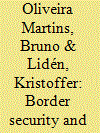

|
|
|
|
|
| Summary/Abstract |
The European Union’s effort at controlling its external borders is an endeavour that increasingly relies on digital systems: from tools for information gathering and surveillance to systems for communicating between different agencies and across member states. This makes EU borders a key site for the politics of “digital sovereignty” – of controlling digital data, software and infrastructures. In this article, we propose a new understanding of how the concepts of digital and sovereignty interplay: sovereignty by digital means, sovereignty of the digital, and sovereignty over the digital. We do it by analysing three key manifestations within the EU’s borderwork: firstly, the expansion of EURODAC to include facial biometric data; secondly, the creation of the (future) shared Biometric Matching System (sBMS); and thirdly, the EU-funded West Africa Police Information System (WAPIS). These databases and systems exemplify three transformations of EU borderwork that invoke different dimensions of digital sovereignty: expansion of techniques for governing migration; interoperability of EU databases facilitating the internalisation of borders through domestic policing; and extra-territorialization of borderwork beyond the geographic limits of the EU.
|
|
|
|
|
|
|
|
|
|
|
|
|
|
|
|
| 3 |
ID:
136074


|
|
|
|
|
| Summary/Abstract |
“Smart Defense” is NATO's new approach to risk- and burden-sharing, which has been a chronic problem within the alliance since the 1950s. Numerous solutions have been proposed, but initiatives resulting in more equitable burden-sharing have never been fully implemented. There are two driving forces influencing a county's willingness to support such initiatives – the economic theory of alliances and the risks posed by the implementation of capability sharing. The authors examine each of these and propose that rather than aiming for group consensus on the production of capabilities, NATO should focus on interoperability through support functions. This approach provides the most likely solution for connecting the forces, doctrine, procedures, standards and other factors of joint capability production such that country leaders find the risks of doing so to be politically and militarily acceptable.
|
|
|
|
|
|
|
|
|
|
|
|
|
|
|
|
| 4 |
ID:
160800
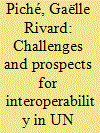

|
|
|
|
|
| Summary/Abstract |
Interoperability is central to UN peace operations. These operations are civilian-led enterprises that pursue complex objectives, which often can only be achieved through the close collaboration of civilian, police, and military actors. As a result, coordination and interoperability between civilian and uniformed personnel in peace operations is not only desirable but often necessary to the success of these missions. Yet, interoperability is not a given. Peace operations face important challenges that can undermine the ability of their different components to work effectively together towards common objectives. Based on observations made during field research in Haiti and time spent at the UN headquarters in New York City, this essay discusses the challenges faced by peace operations in regard to interoperability, factors that facilitate interoperability, and implications for Canada’s announced return to peacekeeping.
|
|
|
|
|
|
|
|
|
|
|
|
|
|
|
|
| 5 |
ID:
074989
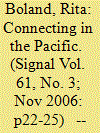

|
|
|
| 6 |
ID:
148061
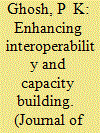

|
|
|
|
|
| Summary/Abstract |
India perceives itself as a net security provider and a balancer of power in the Indian Ocean Region (IOR). This has resulted in the emergence of the Indian Navy (IN) as an important actor in the implementation of India’s foreign policy that embraces a holistic approach towards maritime security cooperation and capacity building. Having overcome its Cold War era isolationistic profile, the IN has expanded its maritime outreach in the IOR and beyond the region. Given that India is perceived as a benign power this has proved to be a strategic advantage in favor of India. The prime driver of increasing role of IN is to counter Chinese moves in the IOR following New Delhi’s discomfort and apprehension with China. To address this, the IN has been conducting regular joint exercises for enhancing interoperability, largesse towards weapon inventory, port visits and coordinated patrols, and assistance. In addition, the IN follows a cooperative approach for sharing of security-related technology. In this manner, the IN has successfully furthered India’s foreign policy objectives while achieving its maritime and strategic aims.
|
|
|
|
|
|
|
|
|
|
|
|
|
|
|
|
| 7 |
ID:
187082
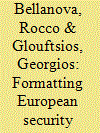

|
|
|
|
|
| Summary/Abstract |
In this article, we explore the security politics of EU database interoperability, inquiring how knowledge infrastructures underpin European security integration. Sitting at the intersection of Science and Technology Studies (STS) and critical approaches to European security, we unpack the co-constitutive relation between database anxieties and interoperability mechanisms. By database anxieties, we refer to what European institutions identify as the main epistemic and operational concerns that emerge from the current use of databases by security authorities across Europe. These anxieties are expected to be resolved by mechanisms that foster interoperability. We argue that the relation between database anxieties and interoperability mechanisms shapes the novel conditions of possibility for European security integration in a datafied world. While far-reaching in technological terms, interoperability is not about introducing a new overarching system, but about the management, re-organisation and re-purposing of datasets. Such formatting matters politically because it eventually informs sovereign acts of policing and mobility control.
|
|
|
|
|
|
|
|
|
|
|
|
|
|
|
|
| 8 |
ID:
148967
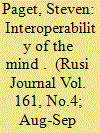

|
|
|
|
|
| Summary/Abstract |
The prevalence of coalition operations has ensured that interoperability between multinational forces is of overarching importance. Although historically interoperability was mainly seen as a matter of technology, Steven Paget argues that cultural interoperability is just as, if not more, significant. Cultural interoperability can be developed in many ways, but exchanges of international students and teachers during the process of professional military education has the potential to redress negative stereotypes, solidify strong existing bonds and enhance interoperability. As a considerable number of international exchange officers at professional military education institutions progress to the highest ranks of their own armed forces, the potential long-term benefits are vast.
|
|
|
|
|
|
|
|
|
|
|
|
|
|
|
|
| 9 |
ID:
173716
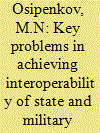

|
|
|
|
|
| Summary/Abstract |
The paper analyses interoperability in organizing information interaction of information systems of federal executive bodies and the firmware complex of the National Center for Defense Control of the Russian Federation (RF NCDC). The main problems associated with the achievement of interoperability are identified, and ways to solve them are outlined.
|
|
|
|
|
|
|
|
|
|
|
|
|
|
|
|
| 10 |
ID:
112051
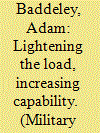

|
|
|
| 11 |
ID:
121243
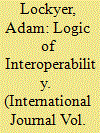

|
|
|
|
|
| Publication |
2013.
|
| Summary/Abstract |
Since 1918, Australia has joined the United States in every one of its major
conflicts: World War Two, Korea, Vietnam, the Persian Gulf, Somalia,
Afghanistan, and Iraq. Australia's enduring commitment to the alliance has
led to a renewed focus on joint operations. The new maxim within Australian
defence circles is "interoperability." Interoperability with the US military
has become the keystone phrase for many issues relating to Australia's
procurement, strategy, and doctrine. Yet the other phrase used equally as
often is "self-reliance." Australian strategic planners simultaneously view the
US as an indispensable and unreliable ally. Although Australia has always
been at America's side, Australia was disappointed by the unenthusiastic
response of the US to the 1999 East Timor crisis. As such, the underlining
logic of interoperability is to hedge between dependence and self-reliance.
|
|
|
|
|
|
|
|
|
|
|
|
|
|
|
|
| 12 |
ID:
179028
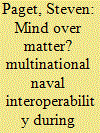

|
|
|
|
|
| Summary/Abstract |
The increasing frequency of multinational operations has heightened the importance of interoperability. While human and cultural factors are only two pieces of the interoperability jigsaw they are of enduring significance. The cohesiveness of the relationship amongst the Royal Australian Navy, the Royal Navy and the United States Navy during the 2003 Iraq War was underpinned by high levels of perceptive interoperability, which manifested itself in effective working relationships. That conflict demonstrated that while historical ties provided a foundation for cooperation, a number of multinational initiatives were undertaken to further enhance interoperability. This article addresses how such a high level of perceptive interoperability was achieved by examining the conduct of multinational exercises, the importance of personnel exchanges and the role of liaison officers, before considering the effect it had on the conduct of operations. The Iraq War demonstrated that cultural factors are at least as important as other facets of interoperability.
|
|
|
|
|
|
|
|
|
|
|
|
|
|
|
|
| 13 |
ID:
070465
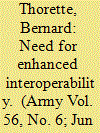

|
|
|
| 14 |
ID:
156531
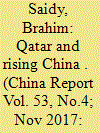

|
|
|
|
|
| Summary/Abstract |
This article explores the Qatari perception of the partnership with China on the basis of three factors: globalisation, the absence of a legacy of colonialism and the principles of non-intervention and respect for state sovereignty professed in China’s foreign policy. China’s perception of its relations with Qatar is embedded within its understanding of the regional order in the Middle East and reflects its assessment of the geopolitical factors that are transforming Gulf countries. It emerges from this analysis that the diplomatic and economic aspects of Qatar–China relations are substantial and well institutionalised. However, military cooperation is still underdeveloped despite the increase of military-to-military contacts.
|
|
|
|
|
|
|
|
|
|
|
|
|
|
|
|
| 15 |
ID:
089335
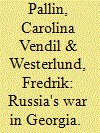

|
|
|
|
|
| Publication |
2009.
|
| Summary/Abstract |
The Russian military operation during the Five-Day war in Georgia points to a number of lessons with strategic implications for Russia. The deficiencies in its military performance - not least concerning C4ISR and precision strike capability - have underscored the need for a modernization of the Armed Forces and a diversification of Russia's military capability. Russia needs to arrive at a strategic decision on the priorities for the future development of its military and defence industry: should it prepare for large-scale wars or post-modern warfare and counter-insurgence? In the meantime, the scope of Russian military strategy will be clearly limited and military force will remain a powerful but blunt security policy instrument.
|
|
|
|
|
|
|
|
|
|
|
|
|
|
|
|
| 16 |
ID:
144766
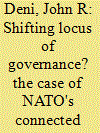

|
|
|
|
|
| Summary/Abstract |
In early 2012, NATO's then-Secretary General, Anders Fogh Rasmussen, unveiled the Connected Forces Initiative (CFI), an effort designed to increase allied interoperability and readiness. Through three lines of effort – training and education, exercises, and better use of technology – the CFI is intended to help the alliance maintain the operational and tactical interoperability it developed in Afghanistan. At first glance, the CFI appears to represent an example of the claims of some neo-institutionalist scholars that there is a shift in the locus of governance from member states to NATO. However, this article takes a deeper look and concludes that in fact the locus of security governance is not shifting, at least not in this instance. Member states of the alliance retain several means of controlling and influencing NATO, thereby preventing it from developing a significant degree of autonomy, in contrast to the European Union or United Nations.
|
|
|
|
|
|
|
|
|
|
|
|
|
|
|
|
| 17 |
ID:
147160
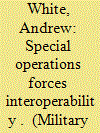

|
|
|
| 18 |
ID:
167457
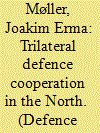

|
|
|
|
|
| Summary/Abstract |
Norway, Sweden and Finland have proclaimed a willingness to cooperate militarily in a future crisis or conflict despite their diverging alliance affiliation. This article assesses their ability to do so through various elements affecting their interoperability, with Arctic Challenge, a multinational military exercise, as an empirical basis. The analysis finds that the NATO/non-NATO-divide has a negative impact on the trilateral defence cooperation, especially on exchange of information and aspects related to command and control. At the same time, Finland and Sweden have become largely NATO-standardized through their active partnership with the Alliance. This has affected interoperability aspects, such as communication, culture, and the compatibility of technical solutions, in a positive manner. Through agreements with the Alliance, as well as domestic legal changes, the two NATO-partners have facilitated receiving military assistance from Norway and other NATO-members during a crisis. Other agreements between the Nordic countries, however, have been limited to peacetime.
|
|
|
|
|
|
|
|
|
|
|
|
|
|
|
|
| 19 |
ID:
179031
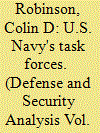

|
|
|
|
|
| Summary/Abstract |
Grouping warships for combat has evolved greatly over the centuries. In the early 1940s, the United States Navy began to group its warships for combat in much more flexible task forces than the previous single-type-of-warship formations. This system has evolved and spread to naval forces ashore but remains fundamentally unchanged. It now covers numbers between 1 to over 1000, of which the most prominent is the first 100 or so which U.S. Navy combat forces use. The numbered fleets worldwide utilize the series covering 20-79; 1-19 and 90-99 appear to be reserved for special allocations and Commander, Pacific Fleet; numbers over 80 to the Atlantic; 100-119 for Northern Europe and briefly Tenth Fleet; the 120 series for Second Fleet as a Joint Task Force leader; the 150 series for Naval Forces Central Command; and the 180 series for Atlantic Fleet and now-Fleet Forces Command.
|
|
|
|
|
|
|
|
|
|
|
|
|
|
|
|
|
|
|
|
|